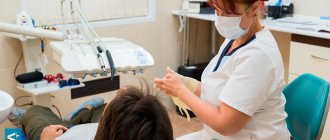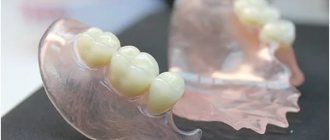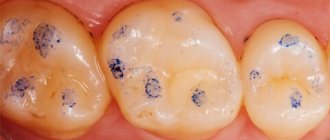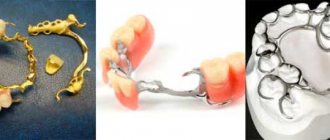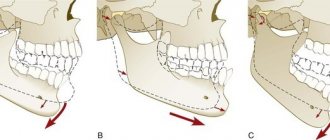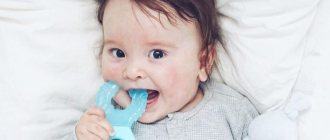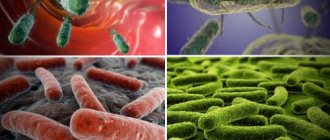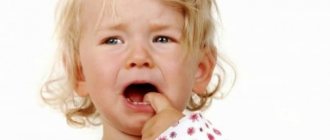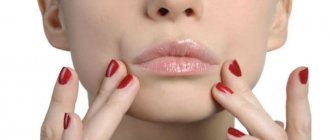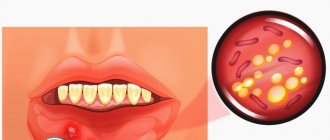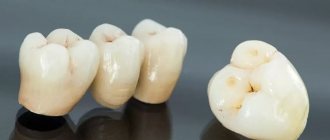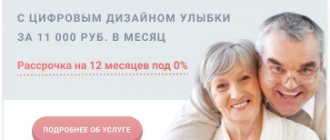July 03, 2018
Averyanova Sveta
The opinion that a baby’s mouth does not need to be cleaned after eating until the first tooth erupts, or even before the primary incisors are replaced with permanent ones, is incorrect. The enamel of children's jaws is thin and susceptible to decay and caries. Those incisors that are still waiting their turn become infected with bacteria. Cleaning your mouth from one year of age or younger can help prevent dental problems in the future.
How to train
Accustoming a two-year-old to daily hygiene procedures is not an easy task. Sometimes this takes months. Recommendations from experienced parents and Dr. Komarovsky help simplify and speed up this process.
- Set an example.
Brush your teeth with your baby in the morning and before bed, don’t be lazy to show what you can do yourself. Play Mirror. The baby will repeat your movements. Develop the habit of going to the bathroom as a family.
- Don't put psychological pressure on your child.
The main thing is to be patient. Do not shout, do not force, if the harmful little one is capricious today and refuses to open his mouth and clean himself. Negative experiences will not help you develop the necessary self-care skills. Sometimes the child needs to be persuaded to watch you, to provoke the desire to taste the paste.
- Use a calendar to brush your child's teeth.
Praise and reward your child for his efforts. Take the time to create a dental brushing calendar for your children. This could be whatman paper, a poster, a diagram. Using a colored felt-tip pen, draw hearts for a good day when the baby went to the bathroom on his own before bed, or a tear from the mother if he was capricious today.
Don't forget about small gifts and surprises.
- Create a fun dentist and patient game.
Involve toys, older sisters or brothers in the process. Let the baby clean the mouth of his beloved bear, and then himself. The role of a doctor will appeal to the young dentist.
- Compete.
Quality, not speed. Involve your family in the game. Give away prizes for the best cleaning. The little student should receive the reward first.
- Use fun accessories to brush your teeth.
This is a toy brush, with a head in the shape of a cartoon character, multi-colored cups, tubes of pastes. Going to the bathroom with your favorite teddy bear or princess is much more fun.
- Provide a choice of toothpaste and brushes for your toddler.
He can independently show in the store which hygiene item is best to purchase. Place several toothpastes for children with pleasant flavors in a glass. It is not necessary to clean your mouth with one product every day; change them according to your mood.
- Connect your imagination and magic.
Come up with a story, a poem about magic brushes or paste. Tell them that obedient and neat children receive surprises from fairies. Treat your baby with a piece of candy or a toy hidden under the pillow in the morning. Next time he will run to the bathroom with pleasure.
- Use educational cartoons.
Educational stories with cute fairy-tale characters motivate little ones to repeat the brush movements after their mother and take care of their health. Watch the cartoon several times, bring the video to kindergarten. It is unlikely that the baby will want to be like the boy who cries in the bathroom, stomps his feet, refusing to brush his teeth, and then suffers from pain and is forced to go to the doctor.
- Explain the consequences of poor hygiene.
It is better to use colorful pictures and photographs from the Internet. Images of incisors worn out by caries and microorganisms will stimulate the child. A lot of cartoons have been made on this topic, useful for still toothless children and adults.
- Keep time on an hourglass.
Visualization is the best teacher. The mythical 2-3 minutes are incomprehensible to the child, and the flowing sand shows how long it takes to brush your teeth. The baby himself controls the duration of the process.
- Visit the dentist.
Do this before the first dental problems arise. The trip should be positive, filled with positive emotions. The doctor will make a suggestion to the capricious ones about the need for oral hygiene and tell them how unpleasant it is to pull out a diseased incisor. The authority of the doctor will affect the child.
- Buy a jaw model.
Or make it yourself. Using a plastic model will make it easier for your baby to learn how to properly clean his mouth. Consider the layout in detail, conduct a training course, tell us how an uncleaned incisor is damaged, and what happens to it next.
Choosing a toothpaste
Almost all pastes are therapeutic and prophylactic. Serve for mechanical cleansing and help prevent caries, periodontitis, and periodontal disease. To do this, the composition includes various components that should be taken into account when choosing a care product:
- Fluorides and calcium. Included in the composition for the prevention of caries and restoration of enamel structure.
- Medicinal plants, essential oils, antiseptic substances (chlorhexidine, triclosan). Eliminate bleeding, swelling of the gums, remove plaque.
- Potassium, strontium, aminofluoride, hydroxyapatite. Reduce tissue sensitivity and relieve pain.
- Enzymes (papain) and antimicrobial substances (lysozyme, lactoferrin, lactoperoxidase). Added to whitening pastes to increase the effectiveness of plaque removal.
- Vitamin complex (A, E, C, B, carotoline). Improves metabolic processes, accelerates the healing of the mucous membrane.
You need to choose a paste depending on your existing dental problems. Don't get carried away with fluoride-containing toothpastes. If there is an excess of fluoride, fluorosis can develop. Therefore, fluoride-containing toothpastes are used no more than once a day.
How to brush your teeth correctly
The fact of cleaning the mouth and the technique of the procedure are important. Many videos have been filmed, books and reminders have been written on how to teach a child to keep their teeth clean, but it is better to follow the following algorithm:
- Rinse the brush in hot boiled water.
- Rinse your mouth with water before brushing.
- Squeeze a pea-sized amount of paste onto the brush.
- Start brushing with vertical movements from top to bottom along the front and back surfaces of the teeth.
- Brush your gums and sides of your teeth in a circular motion.
- Clean interior surfaces from front to back.
- Massage your tongue and cheeks.
- Rinse your mouth with clean water.
- Rinse the brush and place it in a glass, handle down.
Important ! Explain to your child that brushing teeth is an important procedure. It must be done slowly, for at least 2-3 minutes, carefully, not forgetting the gums, tongue and chewing surfaces.
Dr. Zubastik recommends
After each procedure, rinse the brush. Do not store children's and adult teeth-cleaning devices in the same place - the infection can easily spread to neighboring hygiene products.
Interesting! Ancient people ate food given by nature itself, receiving a large amount of vitamins and a massage effect for the gums. They lived to old age, keeping all their teeth in excellent condition. Our ancestors ate rough, solid food and fruits without using a knife. According to anthropological researchers, ancient man did not know caries. The lack of teeth could only be a consequence of surviving and fighting the beast.
Tags: braces, toothbrush, toothpicks, teeth cleaning
About the author: Dr. Zubastik
Typically, a toothache begins to subside on the way to the clinic and finally goes away after 10 minutes of sitting in line to see the dentist.
- Related Posts
- How to properly use miswak to brush your teeth
- Rating 2022: Best electric toothbrushes
- Sponges for cleaning teeth: how to use?
« Previous entry
If the child does not want
You can overcome your toddler’s reluctance to pay attention to cleaning the mouth using the following simple methods:
- Play.
Pretend to be little yourself. Ask your child to teach you how to clean your mouth properly. Give him the brush and get ready for the lesson. Make the game fun and relaxed. If you want, praise the baby for “science.” The little reluctant one will like this fun game. Soon he will want his mother to brush his teeth, tickle his tongue and gums, and will want to rinse his mouth with clean water on his own.
- Let me taste the pasta.
Children's dental cosmetics without fluoride are safe even if the baby swallows just a little. Offer your little one several options for pastes with different flavors: raspberry, orange, lemon. Give me a lick. The baby's fear of unknown substances will disappear. The next step will be to clean the front incisors with the paste you like. Take your time, don't force the process to speed up.
- Gather the team in the bathroom.
Use series with bunnies and princesses on packages of pastes and brushes.
Say goodbye to them when you leave the bathroom after washing your face. Tell your baby that they really miss their owner and want to play with him.
- Count the teeth.
While brushing, count the teeth already treated with toothpaste. The brush and mom will act as math teachers. Warn your baby that the teeth are very offended if you forgot to count them; you need to devote some time to each of them. Simultaneously with teaching hygiene, the little ones will learn numbers.
- Don't forget about gifts and surprises.
You can also motivate those who don’t want to with promises of reward. But it must be earned. Buy stickers in the shape of stars and hearts and stick them on the poster all week if your baby complies with the request to go to the bathroom in the morning and evening.
After 7 days, count up the rewards and give out the well-deserved prize. Give your child the opportunity to choose a toy or sweets himself. Agree on this in advance, then the desire for independence will increase significantly.
Useful and proven tips for teaching your child to brush their teeth will not help if you are not patient and do not use your imagination. Remember that the best way for preschoolers to learn is through play.
Remember about teeth not only in the bathroom, but also during the day when your daughter puts the doll to bed. Report that Lala (toy) forgot to brush her teeth. Go to the bathroom with your baby and perform the ritual with the toy. And in the evening, remind her that the doll did not cry, but brushed her teeth and went to bed peacefully.
As a summary
Please note that until the age of 5-6 years, a child cannot brush his teeth properly on his own. Of course, you can leave everything to chance, give the baby a brush and he will fidget with it on his teeth, and the task will be completed. But there will be no benefit from this.
Remember, how you instill in early childhood the habit of caring for your teeth, this is how your child will treat them throughout his life. Therefore, it is necessary to control this process, sometimes up to 10-12 years.
Healthy smiles for your babies!
Moscow metro station Zvezdnaya, Danube Avenue, 23
Poems about brushing teeth for children
Interesting, funny poems and rhymes about brushing your teeth can help mothers. They will tell the child about the rules of hygiene, become motivators for mastering the skill of self-care, while simultaneously expanding the toddler’s vocabulary. Use the following verses for “dental” games, memorize the quatrains together.
Tell story poems before bedtime, during daytime games. Repeat them several times so that the meaning of sad stories about unbrushed teeth is fully understood by the baby.
At what age can you try to teach your child to brush their teeth on their own?
For your information! Gradually accustoming a child to independent oral hygiene should begin no earlier than one and a half years.
At this age, children often copy the behavior of adults, so it is easy to interest the baby with your own example.
However, parents should carefully monitor the baby's reaction.
If your first attempts at brushing your teeth on your own are accompanied by hysterics and screaming, it is better to postpone learning for a while.
It is highly undesirable to force your baby to brush his teeth..
Thus, it is possible to cause aversion to the procedure and fear of it.
Basic preventive measures
Proper nutrition:
- Limiting easily digestible carbohydrates contained in confectionery products.
- Do not eat sweets at night.
- Do not eat sweets between main meals.
- If paragraphs 2 and 3 have been violated, you must thoroughly rinse your mouth or brush your teeth.
- Ensuring sufficient chewing load (introducing vegetables into the diet).
- For normal teeth growth, you need dairy products, fish, which contain calcium and phosphorus, as well as vegetables and fruits rich in vitamins.
Useful video
In this video, Dr. Komarovsky will tell you how and when you need to start teaching your child to brush his teeth on his own:
Oral care is an important component for dental health , so it is necessary to teach your child hygiene from an early age.
You should patiently explain to your child the importance of the procedure and talk about the consequences of neglecting your teeth.
Over time, the child will definitely begin to brush his teeth on his own, without persuasion or reminders.
Oil pulling
Illinois-based Schaumburg Dental Studio recommends oil pulling. The method involves using a teaspoon of oil. Pour into your mouth and rinse. Then we spit it out.
“Oil pulling is believed to remove toxins from the mouth,” says Schaumburg Dental Studio, although the science on this is a little murky.
Coconut and sesame oils are considered the most effective for removing toxins, but sunflower or olive oil can also help.
Cover: fizkes (Shutterstock)
